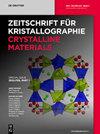nias衍生的氰酰胺(碳二亚胺)结构-基团理论观点
IF 2.7
4区 材料科学
Q3 CRYSTALLOGRAPHY
Zeitschrift Fur Kristallographie-Crystalline Materials
Pub Date : 2023-01-26
DOI:10.1515/zkri-2022-0062
引用次数: 0
摘要
氰胺和碳二亚胺阴离子是复杂的氮衍生的一维NCN2 -型(因此,类似于O2 -但更多的共价键),它们与来自整个元素周期表的各种金属阳离子形成大量的类盐相。根据颜色(二元,三元和季盐已知),阳离子大小和电荷以及共价贡献,氰酰胺/碳二亚胺发生不同的畸变(特别是倾斜)和/或空位顺序变体。本文总结了源自亚里斯多德型NiAs的氰酰胺/碳二亚胺结构。根据群-亚族方案(Bärnighausen树)对晶体化学进行了讨论。本文章由计算机程序翻译,如有差异,请以英文原文为准。
NiAs-derived cyanamide (carbodiimide) structures – a group-theoretical view
Abstract The cyanamide and carbodiimide anions are complex nitrogen-derived one-dimensional species of the type NCN2− (hence, resembling O2− but more covalently bonding) that form a huge number of salt-like phases with a variety of metal cations stemming from the whole Periodic Table. Depending on the coloring (binary, ternary and quaternary salts are known), the cationic size and charge as well as covalent contributions, different distortion (tilting in particular) and/or vacancy ordering variants of cyanamides/carbodiimides occur. Herein we summarize those cyanamide/carbodiimide structures that derive from the aristotype NiAs. The crystal chemistry is discussed on the basis of group-subgroup schemes (Bärnighausen trees).
求助全文
通过发布文献求助,成功后即可免费获取论文全文。
去求助
来源期刊

Zeitschrift Fur Kristallographie-Crystalline Materials
CRYSTALLOGRAPHY-
CiteScore
2.00
自引率
16.70%
发文量
55
期刊介绍:
Zeitschrift für Kristallographie – Crystalline Materials was founded in 1877 by Paul von Groth and is today one of the world’s oldest scientific journals. It offers a place for researchers to present results of their theoretical experimental crystallographic studies. The journal presents significant results on structures and on properties of organic/inorganic substances with crystalline character, periodically ordered, modulated or quasicrystalline on static and dynamic phenomena applying the various methods of diffraction, spectroscopy and microscopy.
 求助内容:
求助内容: 应助结果提醒方式:
应助结果提醒方式:


